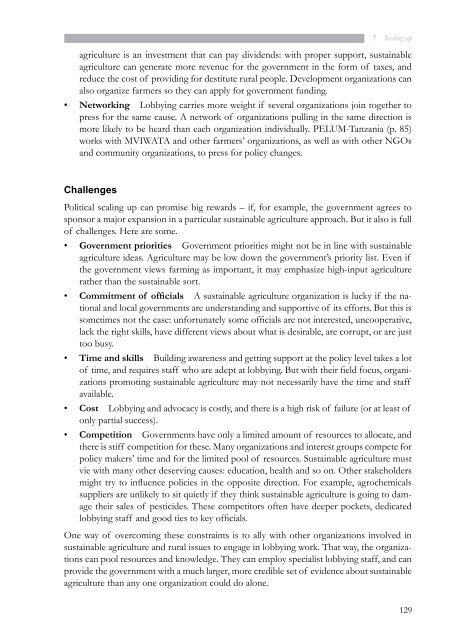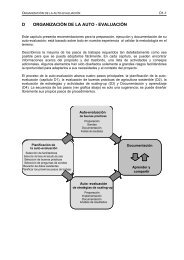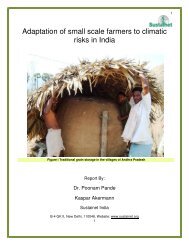cases from tanzania - Sustainet
cases from tanzania - Sustainet
cases from tanzania - Sustainet
Create successful ePaper yourself
Turn your PDF publications into a flip-book with our unique Google optimized e-Paper software.
5 Scaling up<br />
agriculture is an investment that can pay dividends: with proper support, sustainable<br />
agriculture can generate more revenue for the government in the form of taxes, and<br />
reduce the cost of providing for destitute rural people. Development organizations can<br />
also organize farmers so they can apply for government funding.<br />
• Networking Lobbying carries more weight if several organizations join together to<br />
press for the same cause. A network of organizations pulling in the same direction is<br />
more likely to be heard than each organization individually. PELUM-Tanzania (p. 85)<br />
works with MVIWATA and other farmers’ organizations, as well as with other NGOs<br />
and community organizations, to press for policy changes.<br />
challenges<br />
Political scaling up can promise big rewards – if, for example, the government agrees to<br />
sponsor a major expansion in a particular sustainable agriculture approach. But it also is full<br />
of challenges. Here are some.<br />
• Government priorities Government priorities might not be in line with sustainable<br />
agriculture ideas. Agriculture may be low down the government’s priority list. Even if<br />
the government views farming as important, it may emphasize high-input agriculture<br />
rather than the sustainable sort.<br />
• Commitment of officials A sustainable agriculture organization is lucky if the national<br />
and local governments are understanding and supportive of its efforts. But this is<br />
sometimes not the case: unfortunately some officials are not interested, uncooperative,<br />
lack the right skills, have different views about what is desirable, are corrupt, or are just<br />
too busy.<br />
• Time and skills Building awareness and getting support at the policy level takes a lot<br />
of time, and requires staff who are adept at lobbying. But with their field focus, organizations<br />
promoting sustainable agriculture may not necessarily have the time and staff<br />
available.<br />
• Cost Lobbying and advocacy is costly, and there is a high risk of failure (or at least of<br />
only partial success).<br />
• Competition Governments have only a limited amount of resources to allocate, and<br />
there is stiff competition for these. Many organizations and interest groups compete for<br />
policy makers’ time and for the limited pool of resources. Sustainable agriculture must<br />
vie with many other deserving causes: education, health and so on. Other stakeholders<br />
might try to influence policies in the opposite direction. For example, agrochemicals<br />
suppliers are unlikely to sit quietly if they think sustainable agriculture is going to damage<br />
their sales of pesticides. These competitors often have deeper pockets, dedicated<br />
lobbying staff and good ties to key officials.<br />
One way of overcoming these constraints is to ally with other organizations involved in<br />
sustainable agriculture and rural issues to engage in lobbying work. That way, the organizations<br />
can pool resources and knowledge. They can employ specialist lobbying staff, and can<br />
provide the government with a much larger, more credible set of evidence about sustainable<br />
agriculture than any one organization could do alone.<br />
129




